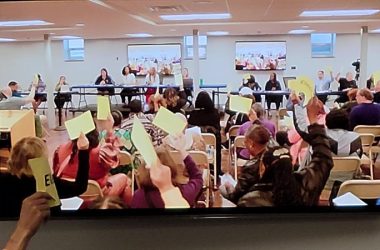In an effort to avoid conflicts with state pension rules, the District 233 school board voted 4-3 to give Homewood-Flossmoor High School Superintendent Von Mansfield his 2018-19 merit pay when he retires.
The arrangement was given the green light by the board’s attorney. Mansfield notified the Teachers Retirement System (TRS) of his intention to retire. He has not officially set a date. Paying him the $17,000 now would mean paying penalties because his salary would have exceeded TRS caps on earnings. The district paid a steep penalty when former Superintendent Laura Murray’s benefit package was deemed to be over the limit.
In 2005, the state imposed a cap of no more than 6 percent in salary and benefits for the last four years of a teacher’s or administrator’s tenure. The District 233 board in 2001 gave Murray salary, merit pay and retirement benefits that exceeded that amount. The board argued it set the payment schedule in a five-year contract and should be grandfathered in, but the courts ruled Murray did not have tenure in the district, as teachers do, so the last two years of Murray’s payment schedule went above the cap. The penalty was $225,884 which the district paid in 2009.
District 233 now has procedures in place to meet the law’s requirements. It is those procedures that triggered the change in how Mansfield would be receiving his 2018-19 merit pay.
Members Steven Anderson, Gerald Pauling, Nathan Legardy and Debbie Berman voted for the payout, and members Annette Bannon, Pam Jackson and Beth Larocca voted against it at the Feb. 18 meeting.
The split vote came after Bannon asked for the measure to be tabled, because she said the issue wasn’t discussed in the form it was presented to the board.
“We had not talked about it in Personnel (Committee),” she said. Bannon is a member of that committee. She recalled “it was mentioned at the end of a meeting, we did not vote on this entirely.” She said the board didn’t consider paying Mansfield once his contract was up.
Member Gerald Pauling, who serves as chair of the Personnel Committee, reminded Bannon that the merit pay was not only discussed at the committee level, it was also discussed by the full board in closed session.
Bannon said she didn’t feel it was wrong to bring the matter before the board again.
“You’re not incorrect in bringing this up, but you are incorrect in misrepresenting that it wasn’t addressed by the Personnel Committee, and then misrepresenting that it wasn’t addressed by the full board because it was addressed by both,” Pauling said.
He believes the board minutes would reflect his position. Bannon countered, saying “The minutes won’t reflect what this says here — that it will be paid out later.”
Board president Anderson said the board has been aware of the issue since June 2019 and unanimously agreed the superintendent had earned the merit pay. He said the agreement helps the board avoid paying a penalty to TRS.
He asked Bannon why she didn’t raise her concerns when she got the agenda four days before the meeting.
“It’s for future reference, all six of you. If you have questions on things that are on the agenda be adults and call me. That’s what I’m saying,” Anderson told board members. “You have the opportunity to do that. You can call and question as to why this is on the agenda.”
Larocca said she agreed with Bannon’s position, telling Anderson: “I do believe we’re supposed to have discussion here, and that’s what this is about.”
After the vote, Larocca told the Chronicle by email that she doesn’t agree with merit pay.
“If you look back at when we voted on the bonuses for the other administrators, I voted ‘no’ then and I will continue to do so,” she said. “I believe that the money spent on bonuses should be spent on the students.”
Jackson, who also voted against the proposal, said by email: “Instead of it coming up for vote, I would have liked to discuss this matter in closed session at greater length with the board and our legal counsel. It is important to me, and I hope the community, that I make informed decisions.”
Bannon said she voted for the agreement in the personnel meeting but had second thoughts after reflecting on it further.
“After the personnel meeting, I disagreed with the process used to communicate any changes that needed to be made,” she said. “This pause allowed more time for me to reflect on the situation. I felt the process was an inappropriate work around, and therefore I changed my mind. In the past, we have not given bonuses when admins have put in for retirement.”
Note: Board member Annette Bannon’s comment was received Thursday by email after the story was first published. We added it to present a more complete account.


